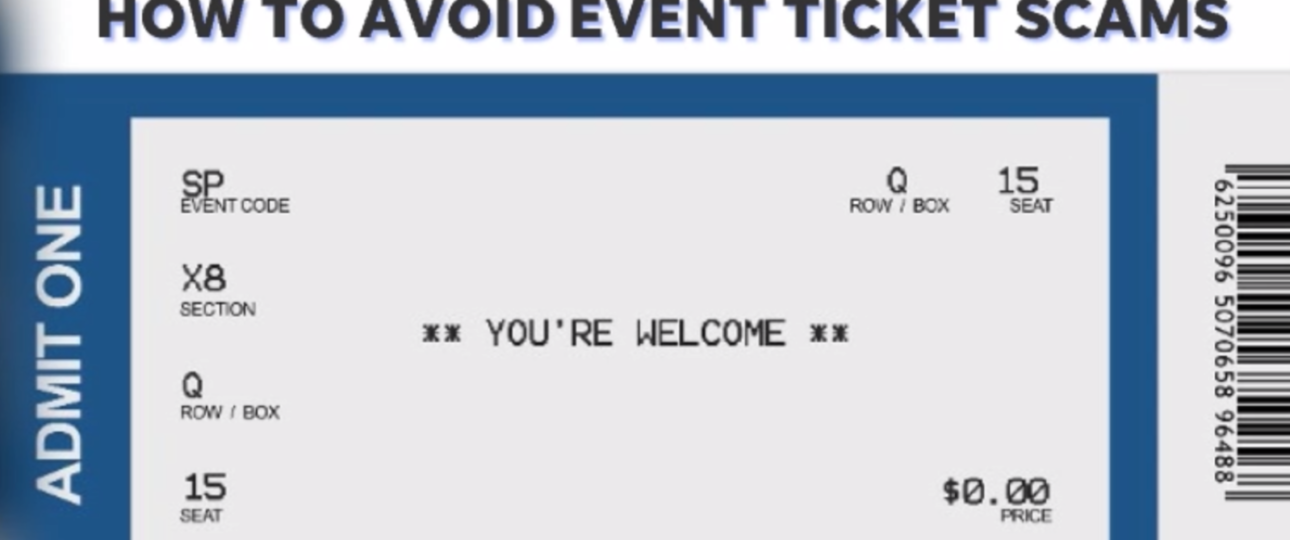Also Are you a fan of live events? Do you love watching your favorite artists, teams, or performers on stage? If so, you know how thrilling it is to get your hands on the tickets you want. But you also know how risky it can be to buy tickets online, especially from unknown sources. You don’t want to end up with fake, invalid, or overpriced tickets, or worse, lose your money and personal information to scammers.
10 Tips to Protect Against Ticketing Scams
According to the Better Business Bureau (BBB), ticket scams are one of the most common types of fraud, especially during peak seasons like summer and holidays. In 2023, the BBB received over 10,000 complaints from consumers who were scammed by fake or dishonest ticket sellers.
These scammers use various tactics to trick customers and make a quick buck. They may sell counterfeit or expired tickets, charge exorbitant fees, or use phishing techniques to steal your identity or credit card information. Some scammers even create fake websites or phone numbers that look like legitimate ticket sellers, such as Ticketmaster or StubHub, and lure you into paying for non-existent tickets.
How can you avoid falling prey to these ticket scams and enjoy your live events without any hassle? Here are some tips to follow:
-
Buy Tickets from Official Sources
The best way to avoid ticket scams is to buy tickets directly from the authorized ticket seller, such as Ticketmaster, StubHub, Eventbrite, or the venue’s box office. These sites have guarantees and policies that protect you in case of any issues with your tickets. You can also check the official website of the event or the artist to find out where to buy tickets safely. For example, if you want to see Ed Sheeran live in concert, you can go to his website and click on the “Tour” tab to see the list of upcoming shows and the links to buy tickets from the official sources.
-
Verify the URL and the Contact Information
If you are buying tickets from a website, make sure that the URL is correct and matches the official ticket seller. For example, the official Ticketmaster website is www.ticketmaster.com, not www.ticket-master.com or www.ticketmaster.co. You can also look for signs of security, such as a padlock icon or “https” in the address bar. These indicate that the website is encrypted and verified. If you are buying tickets over the phone, verify the phone number and the company name before giving any information or payment. You can also ask for a confirmation email or a receipt with the details of your purchase.
-
Avoid Paying with Cash, Wire Transfers, or Gift Cards
These payment methods are often used by scammers because they are hard to trace and recover. Once you send the money, you have no way of getting it back or disputing the charge. Always use a credit card, debit card, or a third-party payment service, such as PayPal, when buying tickets online. These payment methods offer more protection and allow you to dispute any fraudulent charges. If possible, avoid paying in advance and opt for a cash-on-delivery option when buying tickets in person. This way, you can inspect the tickets before handing over the money.
-
Check The Ticket Details and the Seller’s Reputation
Before buying tickets from a secondary market, such as a reseller, a broker, or a scalper, make sure that the tickets are valid and authentic. Check the seat number, the row, the section, and the date and time of the event. Compare the price of the tickets with the face value and the market value. Beware of tickets that are too cheap or too expensive, as they may be fake or stolen. You can also check the seller’s reputation and reviews on sites like BBB, Trustpilot, or Yelp. Avoid buying tickets from sellers who have no contact information, no feedback, or negative feedback. If possible, use a platform that verifies the tickets and the sellers, such as StubHub or SeatGeek.
-
Report Any Suspicious or Fraudulent Activity
If you encounter or fall victim to a ticket scam, report it to the authorities and the ticket seller as soon as possible. You can file a complaint with the BBB, the Federal Trade Commission (FTC), or your state’s attorney general. You can also contact your bank or credit card company to cancel or reverse any unauthorized transactions. By reporting ticket scams, you can help prevent other customers from being scammed and hold the scammers accountable.
-
Be Careful of Social Media Offers
Some scammers may use social media platforms, such as Facebook, Twitter, or Instagram, to advertise or sell tickets. They may claim to have extra tickets, offer discounts, or ask for donations. However, these offers may be too good to be true, and you may end up with fake or non-existent tickets. To avoid social media scams, do not click on any links or attachments that are sent by strangers or unfamiliar accounts. Do not give out any personal or financial information, such as your name, address, phone number, or credit card number. Do not send any money or gift cards to anyone you do not know or trust. If you see any suspicious or fraudulent posts, report them to the social media platform and the BBB.
-
Use a Ticket Checker App
Some ticket sellers, such as Ticketmaster, StubHub, or SeatGeek, have their own mobile apps that allow you to buy, sell, or transfer tickets securely. These apps also have a ticket checker feature that lets you scan the barcode of your ticket and verify its validity. This can help you avoid buying fake or duplicate tickets, or tickets that have been canceled or refunded. You can also use the app to access your digital tickets and show them at the gate. To use a ticket checker app, make sure you download it from the official website or the app store, and not from any third-party sources. Also, make sure you update the app regularly and use a strong password to protect your account.
-
Know Your Rights and Responsibilities
As a ticket buyer, you have certain rights and responsibilities when it comes to purchasing tickets online. You have the right to receive accurate and complete information about the event, the ticket price, the fees, the delivery method, and the refund policy. You have the right to receive your tickets on time and in the condition that you expected. Also, you have the right to dispute any unauthorized or fraudulent charges on your credit card or payment service. You also have the responsibility to read and understand the terms and conditions of the ticket seller and the event organizer. AYou have the responsibility to check the validity and authenticity of your tickets before buying them. You have the responsibility to keep your tickets safe and secure, and not to share them with anyone else.
If you have any questions or concerns, you should contact the ticket seller or the event organizer directly.
-
Be Aware of the Event Cancellation or Postponement Policy
Due to the COVID-19 pandemic, many events have been canceled or postponed, leaving many ticket buyers confused and frustrated. If you have bought tickets for an event that is affected by the pandemic. You should check the event cancellation or postponement policy of the ticket seller and the event organizer. Some ticket sellers may offer refunds, credits, or exchanges, while others may not. Some event organizers may reschedule the event to a later date, while others may cancel it altogether. You should also check your local laws and regulations regarding consumer rights and protections in case of event cancellations or postponements.
If you have any questions or issues. You should contact the ticket seller or the event organizer directly and ask for a clear and written explanation of your options.
-
Educate Yourself and Others About Ticket Scams
One of the best ways to protect yourself and others from ticket scams is to educate yourself and others about the common signs and types of ticket scams. You can read articles, blogs, or reports from reputable sources. Such as the BBB, the FTC, or the NATB, that provide information and advice on how to avoid ticket scams. You can also watch out for any alerts or warnings from the official ticket sellers or event organizers about any potential scams or frauds. You can also share your knowledge and experience with your friends, family, or online communities, and warn them about any suspicious or fraudulent offers or sellers. By spreading awareness and information, you can help prevent ticket scams and protect the live event industry.
Wrapping Up
Don’t let ticket scams ruin your live event experience. Follow the tips we have outlined and buy your tickets from trusted sources. You will be glad you did when you see your favorite stars on stage. Remember, if an offer sounds too good to be true, it probably is. Always do your research and trust your instincts before buying tickets online.




